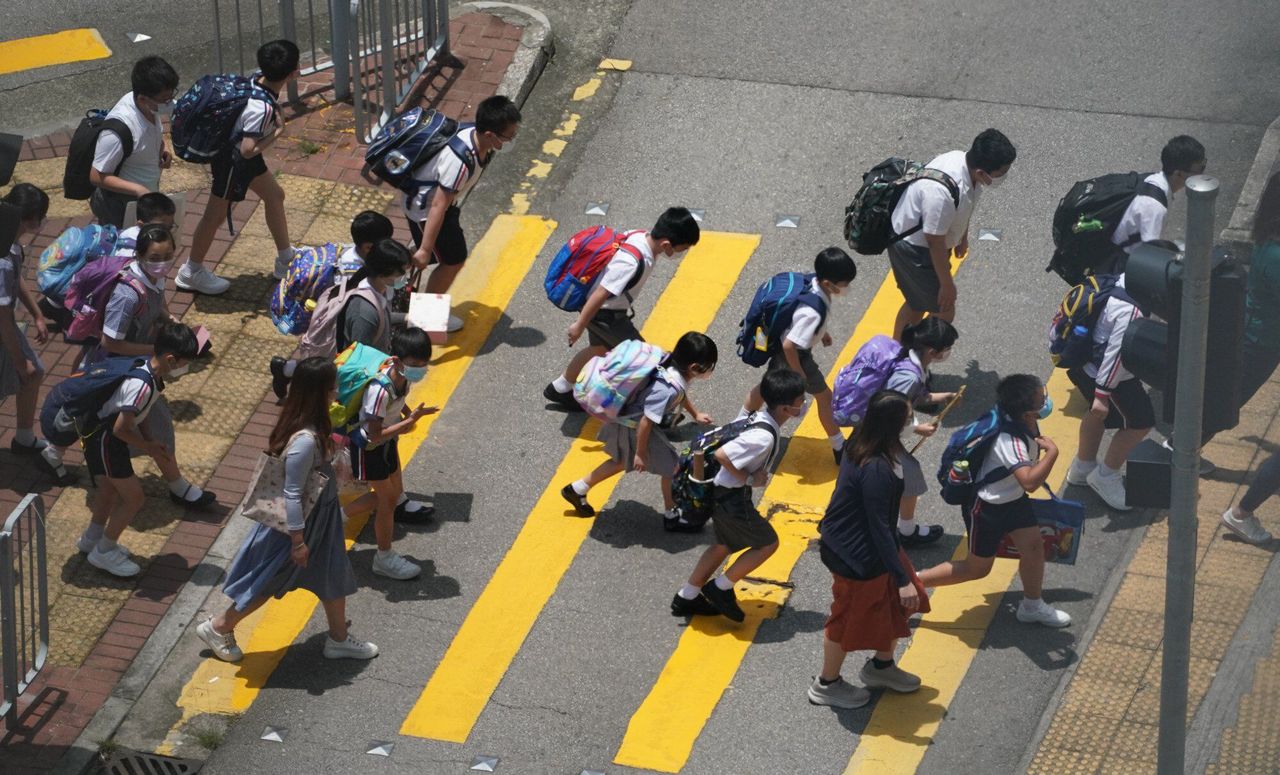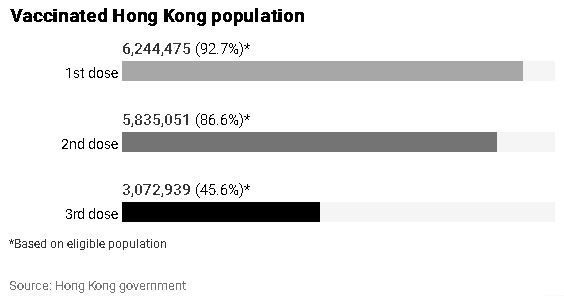Hong Kong News

Worries over cross-infection, Covid tests as Hong Kong schools prepare to reopen
In-person classes will resume at certain Hong Kong schools on Tuesday after a three-month suspension amid warnings of a high risk of Covid-19 cross-infection on campus and concerns over the need to carry out rapid tests on students.
The new policy of requiring pupils to get tested daily for the coronavirus before going to school has sparked concerns from parents of children with special needs, with such families expecting a “serious struggle” over having to subject their young ones to regular nose swabbing.
The Education Bureau earlier announced that in-person classes at the primary level, as well as at special and international schools, could resume on Tuesday after a suspension brought on in January by a fifth wave of infections. But all students have to show negative results on rapid antigen test (RAT) kits.
Pupils at secondary schools and kindergartens can return on May 3 at the earliest, also under the same measures.
 In-person classes for some school levels are set to resume.
In-person classes for some school levels are set to resume.
The epidemic situation locally continued to improve, with 613 new Covid-19 cases logged on Monday, the fourth straight day infections were below the 1,000 mark. Twenty more deaths were also reported.
As schools readied for the resumption of face-to-face classes, Dr Patrick Ip Pak-keung, president of the Hong Kong Paediatric Society, warned that cross-infection risks on campus were “very high” because the Omicron variant was extremely transmissible via short-range airborne particles.
From Tuesday, some consultation quotas at the city’s 23 designated clinics for Covid-19 patients will be reserved for primary and kindergarten pupils, in view of the gradual resumption of in-person classes.
A total of 4,000 quotas were available across the clinics and around half were reserved for patients at higher risk, said Dr Sara Ho Yuen-ha, a chief manager from the Hospital Authority, without specifying how many places were reserved for those children.
Parents with autistic children, meanwhile, expressed anxiety over how their children would take to RATs, which require swabbing sticks to be inserted up a subject’s nose.
Amy Wong, a mother of two girls, said her six-year-old autistic daughter was resistant to any invasive treatment such as dental care. “She has to undergo general anaesthesia when her teeth need to be extracted,” she said.
Wong recalled that her daughter put up a great struggle when she was required to undergo her first RAT at school after a preliminary case was detected among teaching staff.
“She hysterically cried for over half an hour,” the mother said.

Her daughter responded similarly when she underwent her second RAT during a government lockdown, with her fierce response prompting her younger sister to cry as well, Wong said.
She added that she could not imagine how she would swab her daughters’ noses successfully every morning if they were both distraught.
“I’ve already planned that I need to get up at least half an hour earlier to get things done,” she said, adding that she would give snacks and stickers to calm the girls down.
She said the tests should be conducted only when students showed symptoms of Covid-19, not every day.
A staff member working in a special school for the intellectually disabled said the new policy was “disconnected from reality”, expecting a certain number of students would either be late or absent as parents would have difficulties in testing them.
She also said the new requirement had put enormous pressure on schools that also provided boarding services for students with severe behavioural problems. She recalled it once took eight people to perform a RAT test for one student, with the boy having to be held down by his limbs and head.
“Most of them have violent behaviour. I cannot imagine how we can perform the test for dozens of boarding students every morning,” the staff member, who asked to remain anonymous, said.
The Education Bureau has asked schools to test students who failed to get screened at home.
But the staff member of the special school said they also had concerns about performing the tests as parents might hold employees accountable for any injuries, even nosebleeds.
She also doubted the effectiveness of the policy.
“Most parents would like to send their children to school as they cannot cope easily at home. Some parents might just do the test casually without swabbing deep enough,” she pointed out.
Pinky Tai Ngan-yung, director general of the Special Education Needs and Parents Association, said it was not easy to perform RAT for children with special education needs, particularly those with autism, attention deficit and hyperactivity disorder (ADHD) or oppositional defiant disorder (ODD), as they were sensitive to external stimuli.
“If you swab their noses, most of them will probably fight you,” she said, adding the struggle could lead to nosebleeds.
She suggested parents start using cotton buds to clean their children’s noses to get them used to the feeling of being swabbed.
Chu Kwok-keung, lawmaker for the education sector in the Legislative Council, called on authorities to accept rapid antigen oral saliva tests as an alternative.
“Autistic kids are very reluctant to get their noses swabbed, parents can hardly perform the tests,” he said in a written message to the bureau last week.
A spokesman for the bureau said it already provided a set of teaching and learning resources, including situational stories, on collecting samples for school staff and parents.
“The Education Bureau suggests schools call on parents to let students know and get used to the relevant [RAT] procedures before in-person classes resume to allow for a smoother process,” he said.
Dr Au Ka-wing of the Centre for Health Protection said the test should be done before brushing teeth.
“For parents who haven’t done a RAT [on their children] before, they should get ready on [Monday] and read the instructions,” Au said.
Ho from the Hospital Authority urged parents not to panic if their child tested positive for Covid-19 through the test. She urged them to report the result to the school and not to bring their infected child – or other children in the same household – to classes.
A joint recommendation issued by five paediatric medical groups on Monday said parents could prepare children for the RAT procedure by demonstrating it on a toy doll. During the procedure, the children can hold their favourite toy to help them feel safe and be cooperative.
The experts said if a nosebleed happened during testing and it was not serious, the nasal swab could be performed again after a short rest.
The groups did not recommend the oral version of RAT for children as it has not been approved by local health authorities. Children might hurt their tongue or mouth if they struggled or played around with the stick used, the experts said.











